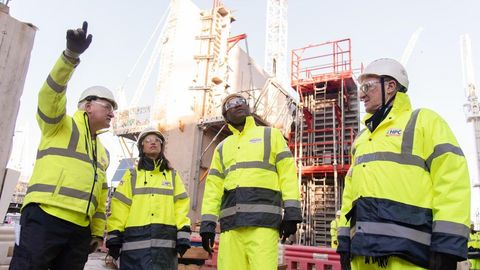Members
EDF Energy: Franco-British collaboration to reach net zero

For EDF Energy, sponsors of our Franco-British Reception at Parliament last week, cooperation between France and the UK is an essential part of business operations. As construction of a new generation of nuclear power plants gets underway in UK, the country can learn a lot from France’s approach
EDF Energy is the UK’s biggest generator of zero-carbon electricity. A wholly-owned subsidiary of French state-owned electricity company Électricité de France, it operates eight nuclear power stations across the UK and is building a new plant at Hinkley Point C in Somerset, scheduled to begin operations in 2026.
“For us, it’s essential that there is a very strong relationship between France and the UK on a range of topics around energy transition,” says Paul Spence, EDF’s Director of Strategy and Corporate Affairs. “That relationship needs to be effective at all levels, from policymaking through to industrial collaboration. This will be a particular focus for us in 2022.”
“Recent events have shown us that we can’t just look to target the climate crisis as individual countries,” adds Emily Follis, the company’s Senior Corporate Affairs Manager. “We need a shared response to help all countries of the world to get to net zero.”
As construction of Hinkley Point C continues, EDF continues to draw inspiration from its experiences working in the French sector.
Cross-channel cooperation at every level
Hinkley Point C, Britain’s biggest net-zero project, is “truly a Franco-British collaboration at every level”, Spence says.
The plant is the first nuclear power station to be built in the UK in over 20 years and will ultimately provide low-carbon electricity for up to 6 million homes. Construction started after the final investment decision was reached in late 2016.
“Right from the start of the project, we looked to get the best of the experience from our French plant at Flamanville, and couple that with the best of British capability in project delivery.”
This has led to the establishment of dedicated Franco-British joint ventures to work on specific aspects of the project. BYLOR, which brings together French construction giant Bouygues and British firm Laing O’Rourke, is one example of these. In this particular venture, Bouygues brings its extensive knowledge of the construction sector in France, with Laing O’Rourke bringing a wealth of expertise from projects such as the 2012 Olympic Games.
“Put that together and you have the capability to deliver some of the massive civil engineering components of the project with the best mix of French and British experience.”
Learning from the French vision
President Macron recently announced that France would build at least six – and possibly up to 14 – new nuclear reactors by 2050 to support the country’s transition towards net zero emissions. In view of the UK government’s commitment to wean the country off its dependency on gas, Spence says, a lot can be learned from the French strategy.
“France is being very purposeful in planning ahead and thinking about what skills will be needed to deliver these big projects as they come to fruition. We also need to be thinking about how best to build that pipeline of skills.”
This long-term planning includes things like setting up a network of training academies to make sure workers are fully equipped with the requisite knowledge. As a founding partner of the National College for Nuclear, EDF has played a central role in supporting this.
Strong oversight at every stage
EDF’s experiences building its Flamanville plant have also drawn attention to the need for all aspects of the project to be tightly managed at every stage.
“We learnt very early that as the ultimate builder of the project, we needed to work very closely with the teams in France producing the materials,” Spence says.
The effective planning of a project like this involves a strong focus on quality control. To guarantee safety, construction of components must follow designs with exact precision – and when material reaches the site, it must be installed in strict accordance with instructions. By investing more time up-front to ensure this, EDF can avoid potential delays and increase efficiency.
In the long term, EDF’s commitment to Franco-British collaboration only looks set to deepen.
“Now more than ever, we need to work on building the right bridges between the UK and France,” Spence says. “All of the recent global crises – the climate crisis, Brexit, the COVID-19 pandemic and now the invasion of Ukraine – have reinforced the need for countries to work closely together as we work towards a zero-carbon world.”
EDF Energy is one of the UK’s largest energy companies and the country’s largest producer of low-carbon electricity, producing around one-fifth of the nation's electricity from its nuclear power stations, wind farms, coal and gas power stations and combined heat and power plants. EDF Energy supplies gas and electricity to over 5 million customer accounts and is the biggest supplier of electricity by volume in Great Britain.
